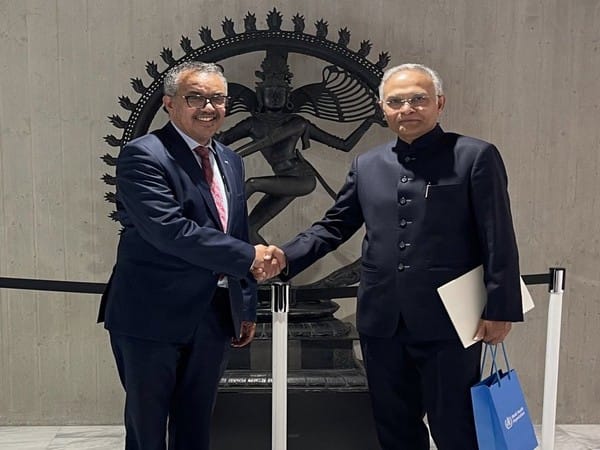Geneva [Switzerland], June 14 (ANI): Secretary (West) Ministry of External Affairs, Sanjay Verma had a warm, fruitful meeting with Director-General of the World Health Organization Tedros Adhanom Ghebreyesus on Monday.
They discussed further strengthening India-WHO relations, and working together for global health and well-being, including in Traditional Medicine & Digital Health.
“Secretary(West) @SanjayVermalFS had a warm, fruitful meeting with DG @WHO@DrTedros. They discussed further strengthening India-WHO relations, working together for global health and well-being, including in Traditional Medicine & Digital Health,” tweeted Permanent Mission of India, Geneva.
Recently, the ground-breaking ceremony was performed for the first-of-its-kind World Health Organization (WHO) Global Centre for Traditional Medicine (GCTM) in Jamnagar, Gujarat.
Additionally, the Global Ayush Investment and Innovation Summit was held in Gandhinagar aimed at increasing investments and showcasing innovations in the field of traditional medicine.
It is a unique attempt to foster long-lasting partnerships, boost exports and nurture a sustainable ecosystem.
The purpose for establishing GCTM is the integration of traditional medicines with technological advancements; setting policies and standards; and supporting efforts to implement the WHO strategy.
According to WHO estimates, 80 per cent of the world’s population uses traditional medicine.
India has committed an estimated USD 250 million to support the GCTM’s establishment, infrastructure and operations.
According to the WHO, traditional medicine is the total sum of the “knowledge, skills and practises indigenous and different cultures have used over time to maintain health and prevent, diagnose and treat physical and mental illness”.
Its reach encompasses ancient practices such as acupuncture, ayurvedic medicine and herbal mixtures as well as modern medicines.
In India, it is often defined as including practices and therapies — such as yoga, Ayurveda, Siddha.
These therapies and practices have been part of Indian tradition historically as well as others — such as homoeopathy — that became part of Indian tradition over the years.
Ayurveda and yoga are practised widely across the country. The Siddha system is followed predominantly in Tamil Nadu and Kerala
The Sowa-Rigpa system is practised mainly in Leh-Ladakh and Himalayan regions such as Sikkim, Arunachal Pradesh, Darjeeling, Lahaul & Spiti. (ANI)
This report is auto-generated from ANI news service. ThePrint holds no responsibility for its content.






